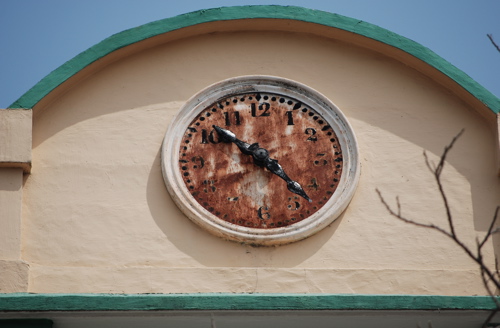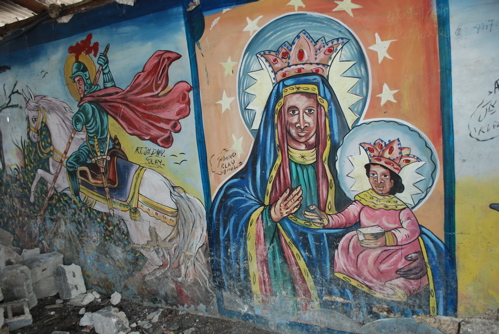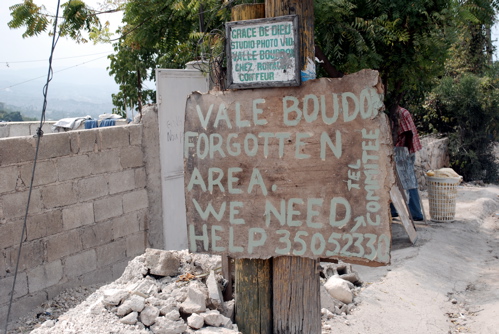
The clock on the school tower marks the time when the heart of Haiti flatlined at 4:53 pm January 12, 2010. Survivors describe a sound like a "groaning coming from the center of the earth" as the Grim Reaper took his toll. Trees swayed, the earth and concrete crumbled into so much rubble, burying the lost -- some still forgotten and abandoned. In the poorest areas, no one has come to help retrieve the bodies still entombed, while US Marines guard the Montana Hotel.
The poor have no honor guard.
For the survivors it was the initial primeval instinct for life that shocked stopped hearts into beating. Haiti has had a massive coronary and, collectively damaged, is operating at a fraction of its normal output. Yet, it is the remarkable resilience of the people of Haiti, who have endured centuries of political and cultural oppression that is the real legacy of the earthquake.
Eight weeks after the quake, at the ruins of the Cathedral of Our Lady of the Assumption (Cathédrale Notre-Dame de L'Assomption), a group of women stood at a black wrought iron fence, while the wind blew dust into miniature tornadoes that danced in the mortar. Their hands waved back and forth in a circadian rhythm as they beseeched the figure of the crucified Christ that towered above the ruins.
"God, we have not heard you for a long time. Come to us."
There was no anger, no recrimination in the request for salvation for the lost and help for the injured. Prayer cannot exist without faith that what was damaged can be repaired.
One of the first questions I was asked upon my arrival in Haiti was about Pat Robertson's statement that Haiti had received its due.
"Did an American preacher really tell his flock that the earthquake was Haiti's punishment for Voudun?" Andres asked.
In reply, I was ashamed to say that this actually did occur, but that people really do not believe that Haiti made a pact with the Devil. In the same breath of denial I had to admit that one of the questions I was asked to pursue was whether or not Christian missionaries were requiring a renunciation of Voudun as a requirement for aid post-earthquake. I have much anecdotal evidence, but no proof of this. However, after interacting with a planeload of missionaries on the flight to Port-au-Prince, it was clear that their primary mission was "salvation," and not rebuilding Haiti.
Religious fundamentalists have long attempted to make sense of human suffering by twisting the existential argument and blaming suffering upon the victim. How Haitians have managed to avoid incorporation of shame into their collective psyche is truly a wonder. Christians, Catholics, fundamentalists and every imaginable stripe of religious denomination have attempted to mold Haiti into their own image. Shame is a powerful motivator and can strip the soul of its dignity. Every victim of abuse knows this.

Image: Ruins of a Voudun temple outside of Leogane. We had permission from the priest to take this photo and others.
And Haiti has certainly been abused by the world. Over the past 200 years and more, religious wars have become a distraction, and worse, a tool for political intervention. There are some who will say, in the vein of Pat Robertson, that the destruction of the Cathedral of the Assumption was God's punishment upon the Catholic Church for its transgressions in Haiti. Of course no reasonable person can believe this, but it is an effective psychological metaphor. It nags at the imagination.
No one can claim ownership of another's belief system. And while Haiti is still recovering, people have turned to their individual faith in a God that does not play favorites.
In the most extreme and unimaginable circumstances of filth, disease, hunger, and fear the Haitian people still look to God. It is an amazing and extraordinary affirmation to witness. Time and time again in the wretched conditions of the IDP camps, men and women would tell us that "God would protect them," and that "no one knows but God why this has happened."
So, the women praying in the dust and wind outside the cathedral ruins are testimony that a church is only a building, designed and constructed by frail humans. Mortar and stone cannot withstand the primeval forces that shaped the earth. Life is tenuous at best and only a mote in the dust of the universe. It is an ironic footnote to the destruction of the Cathedral that the cupola of the north tower once served as a lighthouse that guided mariners, missionaries, and mercenaries into the safety of the Port-au-Prince harbor.
It seems that faith and faith alone has been the pacemaker for the damaged Haitian heart. Faith is more powerful than any cataclysm, but of course Haiti needs more than faith. Haiti does not need handouts. Haiti needs the hands and strong hearts of the world to help sustain her.
The late Pope John Paul II, during a visit to Haiti in 1983, said, "Things must change here."
So far things have not changed and will not improve until the world gets its act together.

If anyone working with a relief agency in Haiti reads this, please go to the Valley Boudo and other ruined hillside communities and help the residents either bury their dead once and for all or retrieve them. It is a simple request, yet it seems to be an impossible one by the lack of response for the poor urban areas. It will bolster their faith that the outside world cares. They already believe that God does.
A line from a song by Americana artist Diana Jones is going through my head this morning. I can't shake it.
All God's children travel life's highway. I search for faces that look like my own. I have not found them this side of glory. I walk alone a long way from home.
Can the world please find a way to walk with Haiti in faith and hope?
